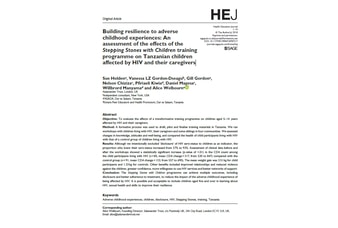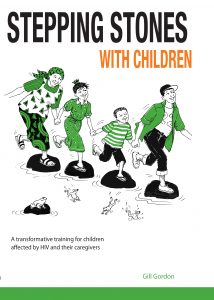 Stepping Stones with Children Counselling Guide
Stepping Stones with Children Counselling Guide
This guide accompanies the Stepping Stones with Children manuals. I wrote it with Jovin Riziki, focussing on the additional knowledge and skills that HIV counsellors need to work with both children who are affected by or living with HIV and their caregivers. We explore the differences between counselling adults and children, and outline the key steps to follow in different counselling situations involving children and caregivers. You can download the guide for free here (scroll down the page); you may need to register with the Salamander Trust’s website to access the document. Also available in KiSwahili.
Extract
We’ve written this guide for people who already have the knowledge, skills and experience needed to counsel adults about HIV and related issues. We haven’t included basic information, such as what counselling is or key skills for counselling. Instead we’ve focused on the additional knowledge and skills that counsellors need to work both with children who are affected by or living with HIV, and with their caregivers. We also outline the key steps to follow in different counselling situations involving children and caregivers. This guide accompanies the Stepping Stones with Children manuals. Children and caregivers who attend Stepping Stones with Children workshops learn to appreciate their abilities, and to find ways of using these to improve their lives. For example: caregivers learn how to discipline children rather than hitting or otherwise punishing them, while children learn how to set boundaries regarding sexual intimacy, and how to protect themselves and others from sexual abuse. Basics of counselling children HIV counselling with children, as with adults, aims to help them cope with emotions and challenges relating to HIV and its effects, and to make informed choices that will improve their quality of life. Though the focus may be on HIV, counsellors need to see and work with the whole child: all the things that affect their life. Counselling children includes:
- helping them tell their story;
- listening carefully;
- giving them correct and appropriate information;
- helping them make informed decisions;
- helping them recognize and build on their strengths;
- helping them develop a positive attitude to life.
Counselling children does not include:
- making decisions for them;
- judging or blaming them;
- interrogating or arguing with them;
- making promises you cannot keep;
- preaching to or lecturing them;
- imposing your own beliefs on them.
Our key tasks during counselling sessions with children and caregivers include:
- helping them understand their situation and how they are feeling by reflecting back what they have told us, both verbally and non-verbally;
- helping them explore their regrets and feelings of blame and anger;
- supporting them in seeing what they may be able to do to improve their situation, even though many factors are beyond their control;
- supporting them in making informed decisions;
- sharing useful information with them;
- supporting them in developing the courage and confidence to come up with their own strategies and hopes and plans for their future.
What’s different about counselling children? There are four key differences when counselling children as opposed to adults.
- We must adjust what we say and do to suit the age and development stage of each child. There should be a big difference between the way we work with a five-year-old who may not yet be able to write, and a 15-year-old who may already be emotionally mature.
- We usually work not with a single client, but with a child and their caregiver(s). We must attend to their different hopes and needs, and support them in working together.
- We have to be willing and able to talk with children about sex and sexuality, and we may find this difficult.
- We need to be mindful of local rules and laws regarding children, for example, knowing at what age and under what circumstances a child can get an HIV test without a caregiver’s consent.
An assessment of the effects of the Stepping Stones with Children training programme on Tanzanian children affected by HIV and their caregivers


 A transformative training for children affected by HIV and their caregivers
A transformative training for children affected by HIV and their caregivers
 Stepping Stones with Children Counselling Guide
Stepping Stones with Children Counselling Guide